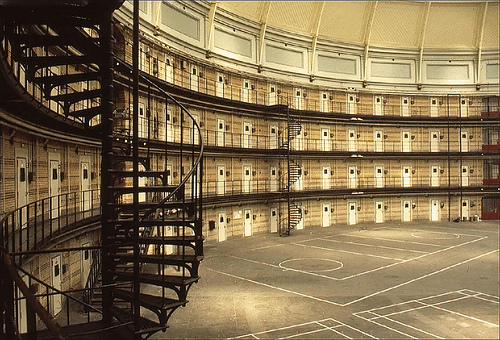This article was written by Sregurupriya Ayappan (Batch of 2020).
“Nothing was your own except the few cubic centimetres in your skull.” -George Orwell
The principle that governed Bentham’s architectural plans for the ideal prison would ensure that even the few cubic centimetres were not your own anymore. The Panopticon was a mode of “obtaining power of mind over mind”. It consisted of an annular building in the periphery that was divided into well-lit cells which held prisoners and could be observed by a supervisor from a central tower. The prisoners’ inability to determine whether they are being watched at a given point of time and the apprehension that they are under surveillance causes them to constantly police their own behaviour. The Panopticon assures that the automatic functioning and actual continuous exercise of surveillance is rendered unnecessary due to perfection of power which is disindividualised and automatized.
Foucault coined the term ‘Panopticism’ to describe this discipline mechanism which amplifies the effectiveness of power and penetrates through society using a “faceless gaze that transforms the whole social body into a field of perception.” Sartre theorised that the apprehension of the ‘look’ forces the observed to occupy a certain position and holds them captive without any escape due to the vulnerability of being seen. The ‘look’ both creates and invades physical spaces, thus trapping the prisoner psychologically. Every person by virtue of being a temporal-spatial object fears the value judgements and unknowable appraisals of the observer. The faceless gaze succeeds in enslaving people and enforcing discipline by keeping them in a constant state of vulnerability.
The Benthamite physics of power is also used in Law School. The NLSIU Act identifies the end to be producing research scholars with a strong sense of social responsibility who will use their skills in legal services, litigation and law reforms. However the ecosystem cultivated by students in Law School, in the form of senior advice and RCC incentive structures leads to students joining the corporate world. This difference between the declared and latent objectives of the institution helps obscure where the power is actually centred. It implies the power comes from without the system and extrinsic factors inuence the power dynamics. It abstracts and makes it dicult to identify the institutional interests, as driven by the actions of stakeholders in the Law School environment.
The faculty, while at first, are accomplices in setting up the system, unwittingly become its prisoners. Their subjectivity is moulded by the internalisation of the externally imposed norms. Their freedom to design their own course outline, mode of instruction and schedule extra classes makes them monitor their own performance in pursuit of achieving total quality. The principle of the Synopticon, in which ‘many’ watch the ‘few’, also influences their behaviour. While they deliver lectures, they police themselves because of the apprehension of being monitored (e.g. Heard In Law School). If their rhetoric reflects that their ideology is contrary to institutional interest it may invite sanctions.
The architecture of the academic block and the presence of security cameras also resemble the Panopticon. Instruments like curfew for the first years, the institutional e-mail interface and the library register also effectuate enclosure. Ironically, in addition to the insidious action of self-monitoring, there is overt self-policing as well. The various student bodies implement a set of rules and regulations, most of which have been drafted by the students themselves, through systematic allotment of sanctions and, rewards in the form of considerable freedom.
This freedom is itself illusory and confines students by forcing them to modify their behaviour in a manner reflective of the free environment. The changes in dressing habits and the manner of speaking are illustrative of this as in many cases it is compelled by the value judgements the student fears are passed by his/her peers. A number of activities are given the status of rituals or unwritten rules by packaging them as ‘law school tradition’ in discourse which helps in indoctrination. Traditions like treats where seniors take it upon themselves to introduce juniors to the great joy of consuming alcohol, the awkward isolation felt due to being surrounded by others who are partaking in the said activity subtly coerces the student into succumbing to it.
The most important panoptic mechanism is the cut-throat competition between the students to achieve an extra line in the list of accomplishments that will adorn the curriculum vitae. This is not limited to the examination system alone but also extends to extra-curricular activities. The CGPA system is perhaps, the metaphorical watchman. The high rate of failure in some courses creates stark inequalities that play on the insecurities of the students. The lack of prior exposure to academic failure heightens their insecurities and spurs self-policing behaviour to increase productivity.
As in George Orwell’s Oceania, the greatest danger of detection does not lie with the Thought Police, hidden microphones or televisions but with fellow citizens. The resistance to the surveillance mechanism in place is limited to a small percentage due to presence of peer inmates. This manifests itself in various forms – fear of being overtaken, exposed or the intricate web of peer politics, self-image or reputation and rumours. This apprehension in itself is effective in regulating behaviour, instilling docility, conformity and productivity.
The residential nature of the university enhances the visibility of the students and it is not feasible to maintain the secrecy around their actions. The few locations are inhabited by other students and hence, each student becomes both the observer and the observed and consciously monitors and modies his/ her behaviour. Visibility is the trap.
“Is it surprising then that prisons resemble factories, schools, barracks, hospitals, which all resemble prisons?”
– Michel Foucault


Comments